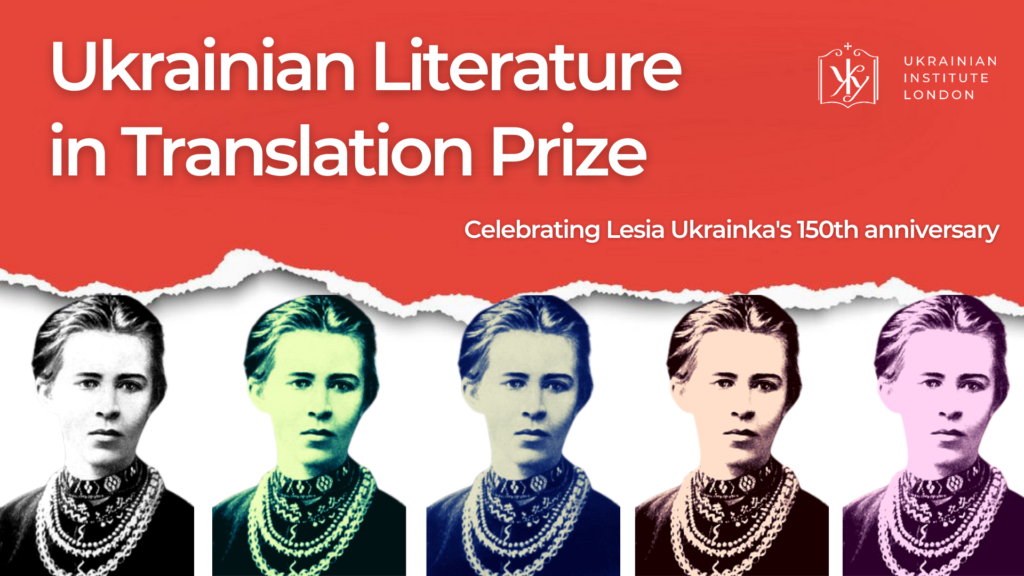
On 16 November, at the British Library, the Ukrainian Institute London awarded its inaugural translation prize to Nina Murray for her translation from Lesia Ukrainka’s drama Cassandra.
Daisy Gibbons, a graduate of Gonville and Caius College now living in London, received the second prize.
The translation competition focused on works by Lesia Ukrainka to commemorate the 150th anniversary of this pioneering feminist writer. The jury, composed of Halyna Hryn, Sasha Dugdale, and Uilleam Blacker, reviewed 33 anonymised submissions.
“Ukrainian literature is so rich, but it does not reach the audiences it deserves because of the lack of translations, in particular into English. With the support of our donors, the Ukrainian Institute London hopes to award Ukrainian Literature in Translation Prize annually and help bring Ukrainian authors to readers around the world”, says Dr Olesya Khromeychuk, Director of Ukrainian Institute London.
Sharp, lucid, erudite, and often interlaced with humour
Dr Sasha Dovzhyk
The modernist Ukrainian writer Lesia Ukrainka (pen name of Larysa Kosach-Kvitka) pioneered a new feminist literature at the forefront of European trends of the time. Her dramas, poetry and prose address concerns from gender and race to feminism and environmentalism. Lesia Ukrainka spoke eight languages and she spent extended periods of time in Germany, Austria, Italy, Bulgaria, Crimea, Georgia, and Egypt.
“The three volumes of Ukrainka’s letters comprise a palimpsest in which the layers of Ukrainian and European cultural history coexist with the personal trials of the emergent heroine of her time, the New Woman. Whether it is the nation-building work of the secret societies of the Ukrainian intelligentsia in the Russian Empire, the latest breakthroughs in Scandinavian theatre, or the challenges encountered by an emancipated woman traveller at the turn of the century, Ukrainka’s analysis is sharp, lucid, erudite, and often interlaced with humour,” writes Sasha Dovzhyk for the British Library.
A growing trend of interest in Ukrainian culture that looks in from without, rather than the other way round
Daisy Gibbons
Nina Murray is a Ukrainian-born American poet and translator. On her choice of “Cassandra”, Murray said: “As a woman and foreign affairs professional, I find the questions of whose foresight and analysis is to be believed and under what circumstances highly relevant and compelling. It is part of the timeless wonder of Lesia Ukrainka’s writing that her characters, Cassandra first and foremost, inhabit this political drama with full and vibrant humanity.”
Daisy Gibbons is a London-based translator. On her choice to translate an excerpt from Lesia Ukrainka’s letters, Gibbons said: “I chose Lesia Ukrainka’s letters to Olha Kobylianska because the language in a funny way reminded me of how I talk to my girlfriends. It’s not every day you see relationships between women portrayed like that, especially not from a literary document more than a century old.”
“Much of Ukrainian literature in translation is carried out by Ukrainians or people of Ukrainian heritage,” Gibbons said. “I am neither, and I hope my interest in Ukrainian culture is part of a growing trend of interest in Ukrainian culture that looks in from without, rather than the other way round.”
The 2022 competition will be announced in spring 2022. For more information, please contact: info@ukrainianinstitute.org.uk.
The award ceremony for the Ukrainian Institute London’s 2021 translation prize took place at the British Library on 16 November, as part of the event The Unknown Feminist of Fin-de-siecle Europe: Lesia Ukrainka.


Nina Murray was born and raised in the Western Ukrainian city of Lviv. She holds advanced degrees in linguistics and creative writing. She is the author of the poetry collection Alcestis in the Underworld (Circling Rivers Press, 2019) as well as chapbooks Minimize Considered (Finishing Line Press, 2018), Minor Heresies (Heartland Review Press, 2020), and Damascus Electric (Pen & Anvil Press, 2020). Her translations from Ukrainian include Oksana Zabuzhko’s Museum of Abandoned Secrets, and Oksana Lutsyshyna’s Ivan and Phoebe (forthcoming from Deep Vellum).
Daisy Gibbons lives in London, where she works for an alternative spiritual nonprofit and press. She graduated from Cambridge University in 2018, having read Russian and Italian. During her studies, she did one year of Ukrainian with the Cambridge Ukrainian Studies programme. This led her to spend time in Kyiv and Mariupol, where she took up translating modern Ukrainian literature.



Sasha Dugdale has published five collections of poems with Carcanet, most recently Deformations in 2020 which was shortlisted for the T. S. Eliot Prize. She won the Forward Prize for Best Single Poem in 2016 and in 2017 she was awarded a Cholmondeley Prize for Poetry. She is former editor of Modern Poetry in Translation and poet-in-residence at St John’s College, Cambridge (2018-2020). (Photo by Zima Zima).
Halyna Hryn is an author, translator, editor and researcher. She is the editor of Hunger by Design: The Great Ukrainian Famine and Its Soviet Context (Harvard University Press, 2009), translator of the novels Peltse and Pentameron (Northwestern University Press, 1996) by Volodymyr Dibrova and Fieldwork in Ukrainian Sex (AmazonCrossing, 2011) and Your Logo Could Be Here: Stories (AmazonCrossing, 2020) by Oksana Zabuzhko. She is editor of the journal Harvard Ukrainian Studies. She received her PhD from the University of Toronto.
Uilleam Blacker is a lecturer in comparative East European culture at the School of Slavonic and East European Studies, University College London. His areas of research interest are the literatures and cultures of Ukraine and Poland and cultural memory in eastern Europe. His monograph Memory, the City and the Legacy of World War II in East-Central Europe was published by Routledge in 2019. He is co-author of Remembering Katyn (Polity, 2012) and co-editor of Memory and Theory in Eastern Europe (Palgrave-Macmillan, 2013). He has published widely on Ukrainian, Polish and Russian literature and culture. He has translated the work of several contemporary Ukrainian writers, including, most recently, Oleg Sentsov’s short story collection Life Went On Anyway (Deep Vellum, 2019).